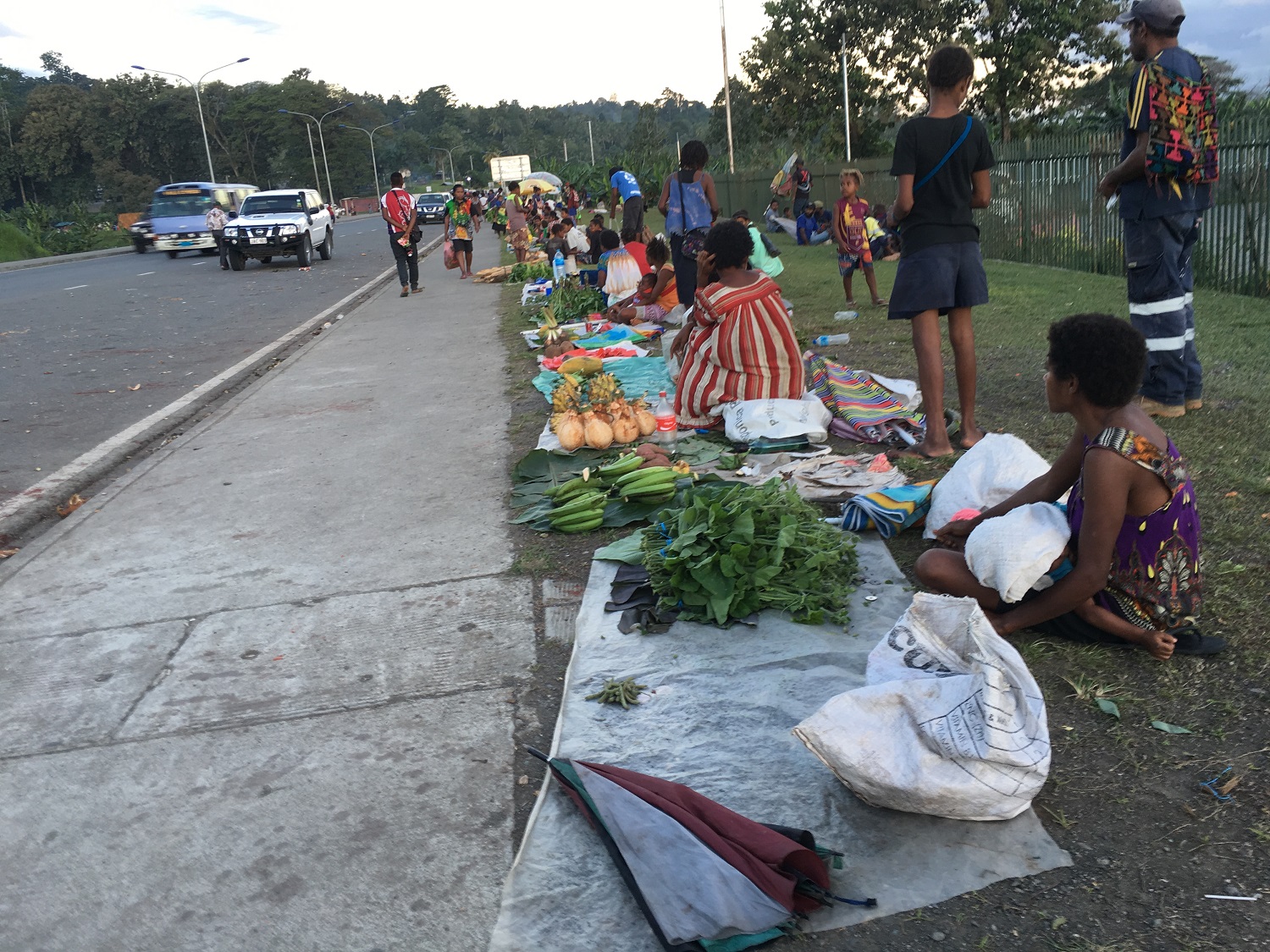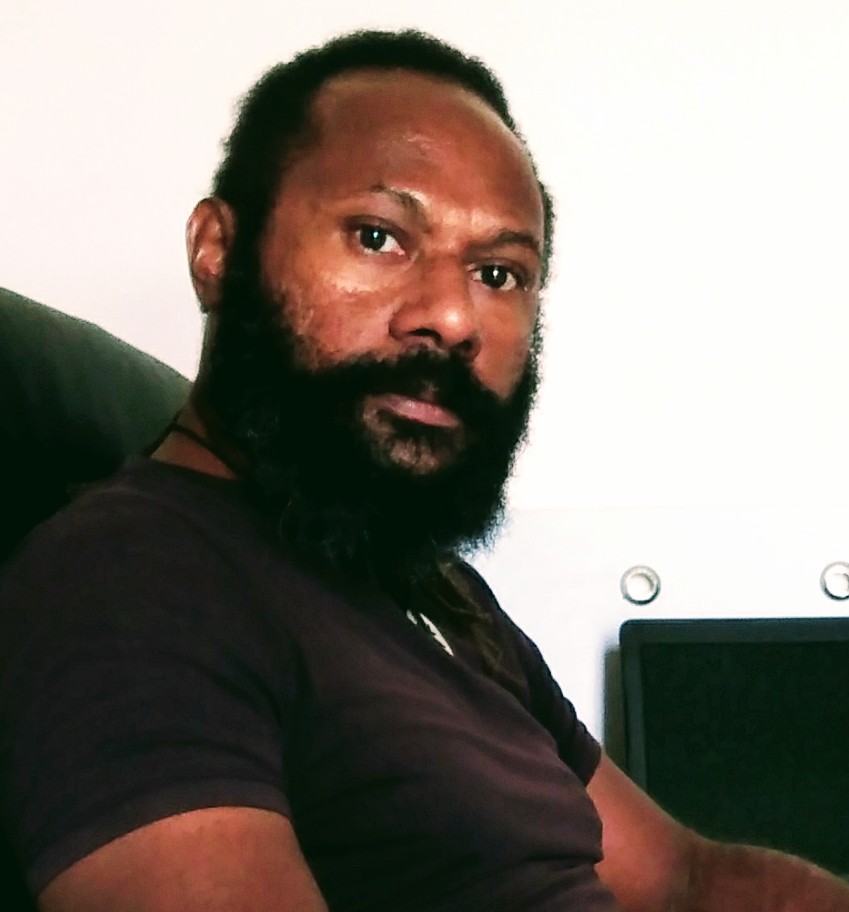The Covid-19 ‘new normal’
The global pandemic of Covid-19 has had many repercussions to daily life and keeping abreast with World Health Organization recommendations, the Papua New Guinea (PNG) government has also defined the ‘new normal’ for its citizens.
But to thousands of the peri-urban poor, struggling to survive during trying economic times, the impact of policing health measures is just another normal day.
At Nine Mile on the Okuk Highway outside of Lae City, PNG’s economic hub, market vendors, mostly mothers, have set up their vegetable selling activities along the side of the road, seated one meter away from moving traffic.
The highway-side markets have been going strong since the middle of May this year, even before the first official nationwide lockdown ended on June 2. It’s a basic survival need for households with annual incomes less than 2,000 Euro.
Nine Mile market is one of a number of popular fresh vegetable markets set up on an informal basis along the highway leading out of Lae. It operates in the afternoons seven days a week but was officially closed during the April to June enforced Covid-19 lock-down, when an expatriate worker fell ill to the viral infection in a hotel at Ten Mile.
The usual location for the market was an area opposite the current lane, an area negotiated with regular disputation, between local land owners, the community and a poultry company based nearby.
The market place itself is a bare patch of land where fresh vegetables are placed on cut plastic sheets or mats and shade may be provided by large umbrellas or lean-to draped with shading cloth.
Informal marketing is the most important economic earning activity for more than half of the population while it is estimated that only about 15% of the country’s 8 million people have formal means of employment.
Yet informal vegetable markets are given scant attention by local level governments for even the most basic services, such as sanitation as simple as a source of clean water to wash hands, let alone a latrine.
Informal market places, such as Nine Mile market are usually set within communities where land use is negotiated with customary land owners who have no obligation to local governments.
It is apparent that local leaders also have no obligations towards community health services.
The best the women marketers at Nine Mile can hope for is that the police won’t turn up to run them off and destroy their produce, as was done to women in a similar predicament in the capital city Port Moresby.
This normal is not new.
Covid-19 und die ‚neue Normalität‘
Die globale Covid-19-Pandemie hat viele Auswirkungen auf das tägliche Leben. Die Regierung von Papua-Neuguinea (PNG) hält sich an die Empfehlungen der Weltgesundheitsorganisation und definiert die ‚neue Normalität‘ für ihre Bürgerinnen und Bürger.
Doch für Tausende von peri-urbanen Armen, die in wirtschaftlich schwierigen Zeiten ums Überleben kämpfen, sind die Folgen von Gesundheitsmaßnahmen ganz normal.
In Nine Mile am Okuk Highway außerhalb von Lae City, dem Wirtschaftszentrum von PNG, wird am Straßenrand, meist von Müttern, Gemüse verkauft – mit nur einem Meter Abstand zum fließenden Verkehr.
Die Märkte am Highway sind seit Mitte Mai diesen Jahres in vollem Gange, noch bevor der erste offizielle Lockdown im Land am 2. Juni endete. Sie sind überlebenswichtig für Haushalte mit Jahreseinkommen unter 2.000 Euro.
Der Nine Mile Markt ist einer von mehreren beliebten Märkten für frisches Gemüse – alle informell entlang des Highways, der aus Lae herausführt. Er ist nachmittags an sieben Tagen die Woche offen. Während des Lockdowns von April bis Juni wurde er offiziell geschlossen, als ein ausländischer Arbeiter in einem Hotel in Ten Mile an dem Virus erkrankte.
Normalerweise fand der Markt auf einer Fläche gegenüber der Fahrbahn statt, wo er jetzt ist. Lokale Landbesitzer, die Community und ein in der Nähe ansässiges Geflügelunternehmen hatten das bei ständigen Streitigkeiten so ausgehandelt.
Der Marktplatz selbst ist ein kahles Stück Land, auf dem frisches Gemüse auf zerschnittenen Plastikplanen oder Matten liegt. Schatten spenden große Schirme oder Verschläge mit Tüchern.
Informelle Märkte schaffen für mehr als die Hälfte der Bevölkerung die wirtschaftlich wichtigste Erwerbstätigkeit. Schätzungen zufolge sind nur etwa 15% der 8 Millionen Einwohnerinnen und Einwohner des Landes formell beschäftigt.
Informelle Gemüsemärkte werden von den lokalen Regierungen jedoch kaum beachtet. Selbst die grundlegendsten Dinge fehlen, wie sanitäre Einrichtungen – also etwas so Simples wie die Möglichkeit, sich die Hände zu waschen, geschweige denn eine Toilette.
Informelle Märkte wie Nine Mile werden normalerweise dort eingerichtet, wo es Gewohnheitsrechte gibt, aber ohne Verpflichtungen gegenüber lokalen Regierungen.
Es ist klar, dass sich die lokale Spitze auch nicht zu kommunalen Gesundheitsdiensten verpflichtet sieht.
Das Beste, auf das die Frauen vom Nine Mile Markt hoffen können: dass die Polizei nicht auftaucht, um sie zu vertreiben und ihre Produkte kaputtzumachen. So erging es Frauen in einer ähnlichen Lage in der Hauptstadt Port Moresby.
Diese Normalität ist nicht neu.
Übersetzung: Iris Thalhammer
Covid-19 ‘noho dala matamatana’
Tanobada egegemada lalonai e varamu gorerena Covid-19 metauna na, ta noho laidiamu mauridia lalodiai vada ta dibadiamu, Bona World Health Organization edia taravatu eiava ede baita mauri toma daladia, e ato lasi, bena Papua New Guinea gavamani ese danu ‘noho dala matamatana’ ealasi ena taunimanima edia.
To settlement ai e nohomu taunimanima dia na ini ededegwamu ina economic crisis lalodia, edia health taravatu dia e ato dio na vada dia gauta.
Lae City na PNG ena trade bona industry gabuna, Lae amo e lasimu dala badana na Okuk Highway bena unuseni ai gabuta na Nine Mile. Bena ini dala badinai e maketimu, hutuma na hahine. Idia na dala esenai mo e helaimu, motuka oromadia danu se lalomu.
May, lagani uanai, edia maketi na e lao goevagoeva. Lockdown ginigunana e hekara, to idia na do unu e maketiva ela bona June 2 ai lockdown taravatu na e atoa siri. Kara ini etomadia e varamu na mauri elaoreana.
Ia danu maketi ta, badina kabedi bona ini gau iboudiai na adorai iboudiai uma amo e lasi laidiamu bena e maketi diamu. To April ela June na taravatu taudia ese e koua, badina tau-kurokuro ta na 10 Mile ai e gorerea.
Guna e maketiva gabuna na e raka tania badina tano taudia bona kokoroku bisinisi tauna ta ida dispute anaianai e abimu.
Umbrella badadia eiava kalaga-kalaga enudiai edia maketi gaudia puse latadiai e atomu
PNG ena population na 8 million, 15% taunimanima dia mo e gaukaramu. A ini taunimanima iboudiai na lasi, unadainai idia bona davadia dia bada ediai black maketi na gau badana.
Local Level Government ese ini taunimanima na e itadia guilagimu eiava se duaidiamu, hegeregeredia, mei-ruma eiava ranu paipu dai danu edia se atomu.
Hanaihanai dala badidia hanuadia na mai maketi dia, egeregerena Nine Mile maketina. Tano lohiadia ida e hereve-hereve gunamu gabeamo edia maketi e karadiamu, tano lohiadia bona local government na se gaukara eboumu.
Tano lohiadia edia laloadai danu unuetomana. Ede baetomu danu lewadia, community health services ediai danu asi gauta.
Nine Mile ai e maketimu hahine dia edia lalo hekwarai tamona na polisi ese basie luludia oho bena edia maketi gaudia bae hadikadia, egeregerena Port Moresby City hahine dia ediai e vara.
Ini gau na dia matamta.
(Gemona Konemamata ese Motu gadoai etorea)
Em normal tasol ia
Bikpela sik Covid-19 pandemic em inapim olgeta kantri long graun na bagarapim laip bilong ol man meri long wanwan dei, em nau World Helt Ogenisesen i givim toksave we Papua Niugini (PNG) gavman tu i laik kamapim ‘niupela nomal’ bilong ol sitisen.
Tasol long ol planti thousand poor pipol istap arere long ol siti, na pilim hevi bilong ekonomi, dispela wok ol polis i mekim long banisim helt em ino niupela, emi nomal pasin.
Long Nine Mile namel long Okuk Haiwei autsait long bikpela bisinis ples Lae Siti, ol maket mama i karim gaden kaikai bilong ol ikam na salim arere tru long bikpela rot.
Dispela ol haiwei maket ibin kirap long mun Mei, em bipo long gavman i givim toksave long pinis bilong lockdown long June 2. Maketim kaikai emi wanpela wokmoni tasol bilong ol hauslain istap long liklik moni mak olsem Euro 2000 long wanwan yia.
Nine Mile Maket emi wanpela tasol bilong ol planti kain maket i stap olsem infomal bisnis ples long dispela haiwei igo long Lae. Ol kain maket i save stap seven dei tasol ol gavman ibin pasim ol dispela maket long April igo inap Jun taim Covid-19 lockdown ikamap, long wanem wanpela overseas wokman ibin kisim dispela sik taim emi silip long wanpela hotel long Ten Mile.
Ples we pastaim maket isave kamap bipo emi long hapsait olgeta long ples we nau emi kamap arere long bikpela rot. Tasol dispela hap graun igat planti tok birua namel long ol papa graun, ol man meri bilong Nine Mile na tu wanpela bikpela kakaruk bisnis.
Maket ples emi sindaun long wanpela hap graun istap nating we ol mama maket isave putim kaikai antap tasol long ol didiman bag na plastik, aninit long ambrala o wanpela kain shed klot.
Infomal maket emi nambawan rot we bikpela hap namba bilong ol pipol isave kisim moni long en, long wanem liklik namba olsem 15% tasol bilong kantri isave mekim sampela fomal wok moni.
Tasol ol local level gavman ino save givim luksave long ol infomal maket long putim helt sevis olsem klinpela wara bilong wasim han na haus toilet.
Olgeta infomal maket wankain olsem long Nine Mile isave stap insait long ol komuniti na ol man meri iet isave toktok wantaim ol papa graun tasol nogat gutpela helpim ikam long local gavman.
Emi luk olsem ol local lida ino save tingting olsem ol igat wok sambai long helt bilong ol komuniti.
Ol mama maket stap olsem tasol na tingting strong olsem ol polis inoken ikam bagarapim sindaun na maket kaikai bilong ol, wankain olsem ol polis ibin mekim long ol mama maket long Pot Mosbi.
Dispela kain nomal em ino niupela.
(Man raitim i tanim Tok Pisin)
Teilen












